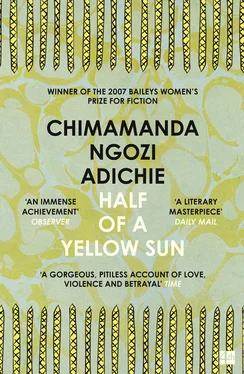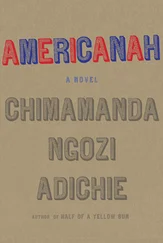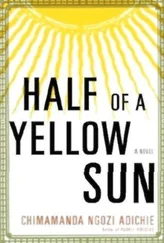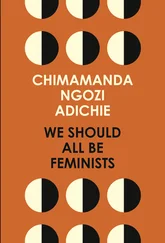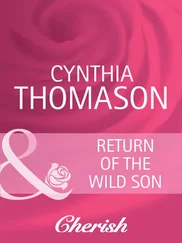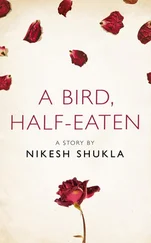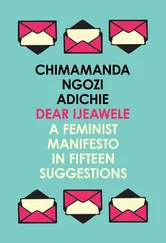‘He will work hard,’ his aunty said. ‘He is a very good boy. Just tell him what he should do. Thank, sah!’
Master grunted in response, watching Ugwu and his aunty with a faintly distracted expression, as if their presence made it difficult for him to remember something important. Ugwu’s aunty patted Ugwu’s shoulder, whispered that he should do well, and turned to the door. After she left, Master put his glasses back on and faced his book, relaxing further into a slanting position, legs stretched out. Even when he turned the pages he did so with his eyes on the book.
Ugwu stood by the door, waiting. Sunlight streamed in through the windows, and from time to time, a gentle breeze lifted the curtains. The room was silent except for the rustle of Master’s page turning. Ugwu stood for a while before he began to edge closer and closer to the bookshelf, as though to hide in it, and then, after a while, he sank down to the floor, cradling his raffia bag between his knees. He looked up at the ceiling, so high up, so piercingly white. He closed his eyes and tried to reimagine this spacious room with the alien furniture, but he couldn’t. He opened his eyes, overcome by a new wonder, and looked around to make sure it was all real. To think that he would sit on these sofas, polish this slippery-smooth floor, wash these gauzy curtains.
‘ Kedu afa gi? What’s your name?’ Master asked, startling him.
Ugwu stood up.
‘What’s your name?’ Master asked again and sat up straight. He filled the armchair, his thick hair that stood high on his head, his muscled arms, his broad shoulders; Ugwu had imagined an older man, somebody frail, and now he felt a sudden fear that he might not please this master who looked so youthfully capable, who looked as if he needed nothing.
‘Ugwu, sah.’
‘Ugwu. And you’ve come from Obukpa?’
‘From Opi, sah.’
‘You could be anything from twelve to thirty.’ Master narrowed his eyes. ‘Probably thirteen.’ He said thirteen in English.
‘Yes, sah.’
Master turned back to his book. Ugwu stood there. Master flipped past some pages and looked up. ‘ Ngwa , go to the kitchen; there should be something you can eat in the fridge.’
‘Yes, sah.’
Ugwu entered the kitchen cautiously, placing one foot slowly after the other. When he saw the white thing, almost as tall as he was, he knew it was the fridge. His aunty had told him about it. A cold barn, she had said, that kept food from going off. He opened it and gasped as the cool air rushed into his face. Oranges, bread, beer, soft drinks: many things in packets and cans were arranged on different levels and, at the top, a roasted, shimmering chicken, whole but for a leg. Ugwu reached out and touched the chicken. The fridge breathed heavily in his ears. He touched the chicken again and licked his finger before he yanked the other leg off, eating it until he had only the cracked, sucked pieces of bones left in his hand. Next, he broke off some bread, a chunk that he would have been excited to share with his siblings if a relative had visited and brought it as a gift. He ate quickly, before Master could come in and change his mind. He had finished eating and was standing by the sink, trying to remember what his aunty had told him about opening it to have water gush out like a spring, when Master walked in. He had put on a print shirt and a pair of trousers. His toes, which peeked through leather slippers, seemed feminine, perhaps because they were so clean; they belonged to feet that always wore shoes.
‘What is it?’ Master asked.
‘Sah?’ Ugwu gestured to the sink.
Master came over and turned the metal tap. ‘You should look around the house and put your bag in the first room on the corridor. I’m going for a walk, to clear my head, i nugo? ’
‘Yes, sah.’ Ugwu watched him leave through the back door. He was not tall. His walk was brisk, energetic, and he looked like Ezeagu, the man who held the wrestling record in Ugwu’s village.
Ugwu turned off the tap, turned it on again, then off. On and off and on and off until he was laughing at the magic of the running water and the chicken and bread that lay balmy in his stomach. He went past the living room and into the corridor. There were books piled on the shelves and tables in the three bedrooms, on the sink and cabinets in the bathroom, stacked from floor to ceiling in the study, and in the storeroom, old journals were stacked next to crates of Coke and cartons of Premier beer. Some of the books were placed face down, open, as though Master had not yet finished reading them but had hastily gone on to another. Ugwu tried to read the titles, but most were too long, too difficult. Non-Parametric Methods. An African Survey. The Great Chain of Being. The Norman Impact Upon England . He walked on tiptoe from room to room, because his feet felt dirty, and as he did so he grew increasingly determined to please Master, to stay in this house of meat and cool floors. He was examining the toilet, running his hand over the black plastic seat, when he heard Master’s voice.
‘Where are you, my good man?’ He said my good man in English.
Ugwu dashed out to the living room. ‘Yes, sah!’
‘What’s your name again?’
‘Ugwu, sah.’
‘Yes, Ugwu. Look here, nee anya , do you know what that is?’ Master pointed, and Ugwu looked at the metal box studded with dangerous-looking knobs.
‘No, sah,’ Ugwu said.
‘It’s a radiogram. It’s new and very good. It’s not like those old gramophones that you have to wind and wind. You have to be very careful around it, very careful. You must never let water touch it.’
‘Yes, sah.’
‘I’m off to play tennis, and then I’ll go on to the staff club.’ Master picked up a few books from the table. ‘I may be back late. So get settled and have a rest.’
‘Yes, sah.’
After Ugwu watched Master drive out of the compound, he went and stood beside the radiogram and looked at it carefully, without touching it. Then he walked around the house, up and down, touching books and curtains and furniture and plates, and when it got dark, he turned the light on and marvelled at how bright the bulb that dangled from the ceiling was, how it did not cast long shadows on the wall like the palm oil lamps back home. His mother would be preparing the evening meal now, pounding akpu in the mortar, the pestle grasped tightly with both hands. Chioke, the junior wife, would be tending the pot of watery soup balanced on three stones over the fire. The children would have come back from the stream and would be taunting and chasing one another under the breadfruit tree. Perhaps Anulika would be watching them. She was the oldest child in the household now, and as they all sat around the fire to eat, she would break up the fights when the younger ones struggled over the strips of dried fish in the soup. She would wait until all the akpu was eaten and then divide the fish so that each child had a piece, and she would keep the biggest for herself, as he had always done.
Ugwu opened the fridge and ate some more bread and chicken, quickly stuffing the food in his mouth while his heart beat as if he were running; then he dug out extra chunks of meat and pulled out the wings. He slipped the pieces into his shorts’ pockets before going to the bedroom. He would keep them until his aunty visited and he would ask her to give them to Anulika. Perhaps he could ask her to give some to Nnesinachi too. That might make Nnesinachi finally notice him. He had never been sure exactly how he and Nnesinachi were related, but he knew they were from the same umunna and therefore could never marry. Yet he wished that his mother would not keep referring to Nnesinachi as his sister, saying things like, ‘Please take this palm oil down to Mama Nnesinachi, and if she is not in, leave it with your sister.’
Читать дальше
